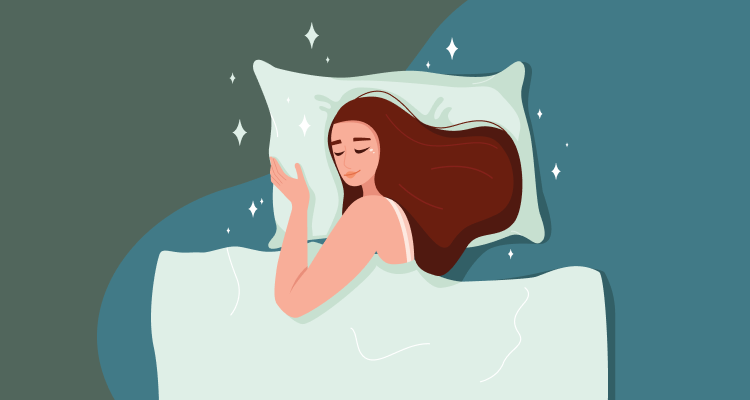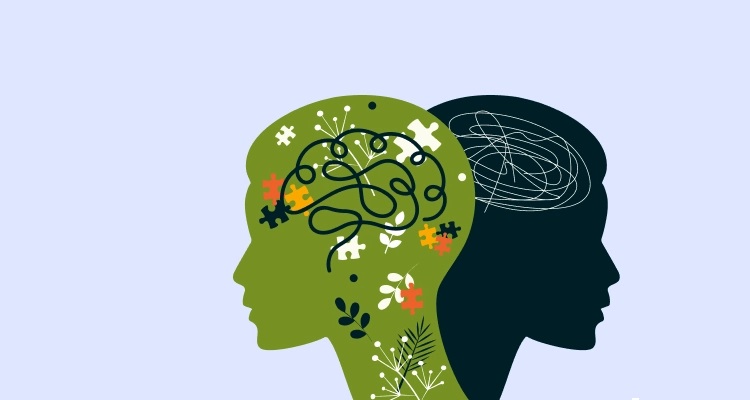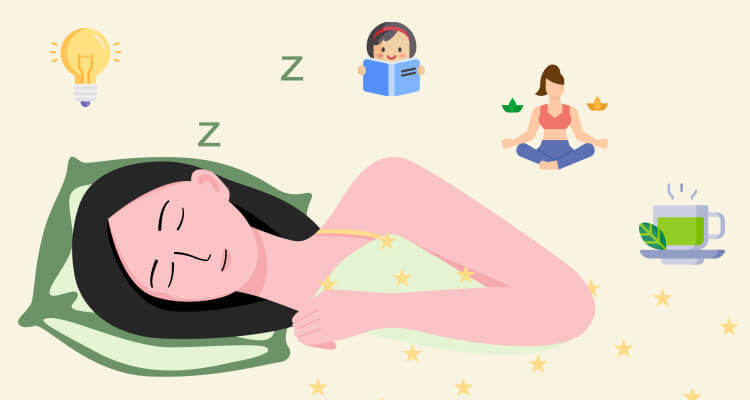“Breath serves as the link between life and awareness, bringing together your body and your thoughts. When your mind feels chaotic, harness your breath to regain control over your thoughts.”
― Thich Nhat Hanh
In a world where stress and sleeplessness seem to go hand in hand, finding natural, effective ways to combat insomnia can feel like a quest for peace. About 10% of the world’s population experiences insomnia, which qualifies as a medical condition, disrupting their ability to enjoy restorative sleep. But what if the solution to better sleep lies in something as simple as your breath?
Breathing is an involuntary action we often take for granted, but when harnessed consciously, it can unlock a powerful pathway to restful sleep.
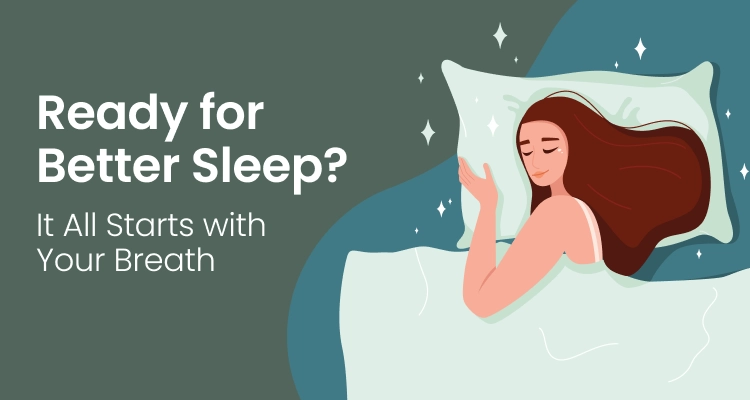
How Breathing Can Help You Sleep Better Tonight?
Breath is more than just oxygen entering your lungs—it is deeply connected to your nervous system. Paying attention to your breath and engaging in mindful breathing activates the parasympathetic nervous system, initiating the body’s natural ‘rest and digest‘ response.
Here are a few reasons why these techniques are effective in combating insomnia:
1. Promotes Relaxation: Focused breathing helps activate the body’s relaxation response. It mitigates the stress response that disturbs sleep and relaxes the nervous system, creating an environment conducive to a restful night.
2. Reduces Anxiety: Many people with insomnia experience racing thoughts or anxiety at bedtime. Breathing techniques provide a simple way to center your mind, allowing you to let go of worries and find peace before sleep.
3. Enhances Mindfulness: Practicing mindful breathing encourages you to stay present in the moment. It can help prevent the mind from wandering to stressful thoughts about the past or future, making it easier to relax and fall asleep.
4. Improves Sleep Quality: Studies have shown that individuals who practice breathing techniques regularly often experience deeper, more restful sleep. Restorative sleep is vital for maintaining overall health, regulating mood, and enhancing cognitive function.
5. Easy to Learn: Breathing techniques are simple and can be done anywhere, making them accessible to everyone. You don’t require special equipment or training—just the openness to practice.
4 Breathing Practices to Soothe Your Mind and Ease Insomnia
Here are some effective breathing techniques that can assist you in relaxing and getting ready for sleep. These methods are simple, accessible, and can be easily integrated into your nightly routine.
- Deep Breathing (Diaphragmatic Breathing)
Deep breathing is a foundational technique that promotes relaxation and helps you focus on your breath.
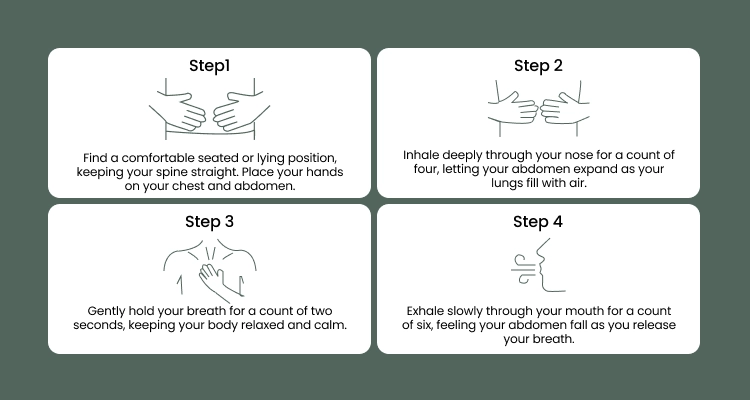
How to Do It:
- Feel free to sit or lie down in a way that feels comfortable, allowing your body to relax. If it helps you focus, feel free to close your eyes.
- Position your hands on your chest and abdomen.
- Take a deep breath through your nose for a count of four, letting your abdomen expand as your lungs fill with air.
- Hold your breath for 2 seconds. Exhale slowly through your mouth for a count of 6 seconds, feeling your abdomen fall as you release your breath.
Duration: Repeat this pattern for 5–10 minutes.
Benefits: It promotes full oxygen exchange that helps to calm both the body and mind, making relaxation and falling asleep easier. It also helps reduce feelings of anxiety and promotes a sense of well-being.
- Alternate Nostril Breathing (Nadi Shodhana Pranayama)
Alternate nostril breathing is an ancient practice that balances energy in the body and promotes mental clarity. By balancing the body’s energy flow and reducing anxiety, alternate nostril breathing helps quiet the mind, making it easier to unwind and drift into restful sleep.
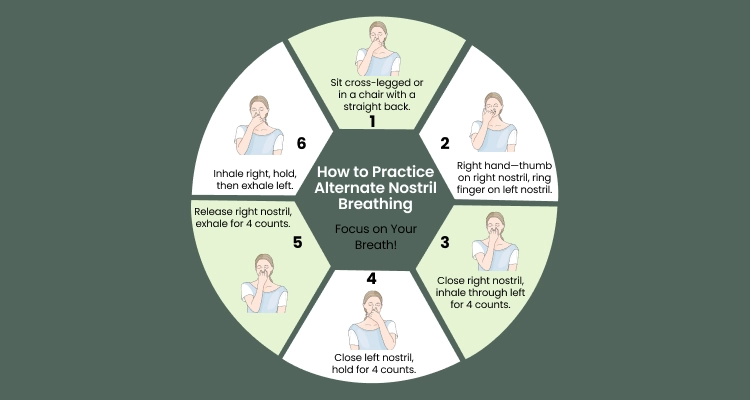
How to Do It:
Duration: Repeat this alternate nostril breathing technique for 6 to 8 cycles.
Benefits: It harmonizes the brain’s left and right hemispheres, fostering mental clarity and tranquility. It alleviates anxiety and prepares you for a restful sleep.
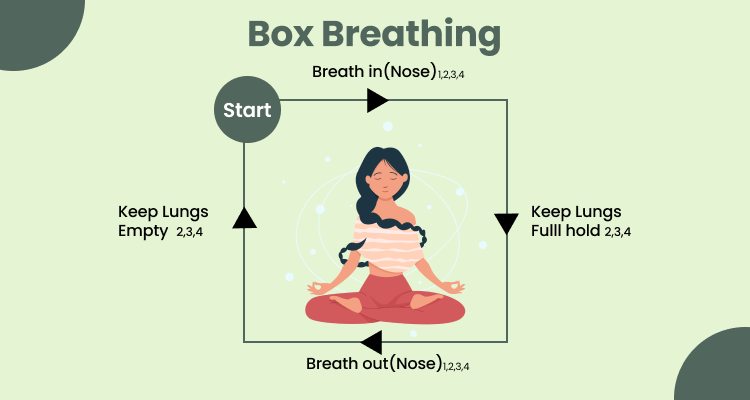
Box Breathing (Square Breathing)
Box breathing is a structured technique that helps regulate your breath and enhance relaxation. Box breathing helps ease insomnia by lowering heart rate and reducing stress, creating a steady rhythm that prepares the mind and body for restful sleep.

How to Do It:
Duration : Repeat this box breathing pattern for 5 minutes.
Benefits: It is a structured breathing pattern that helps regulate your breath and calm your mind, making it easier to transition into sleep. It can also increase feelings of focus and relaxation.
Guided Visualization Breathing
Guided visualization breathing combines deep breathing with mental imagery to enhance relaxation and create a calming environment. By engaging the senses in a peaceful scenario, this technique distracts from overthinking, eases physical tension, and encourages a deeply relaxed state, making it easier to transition into sleep.
How to Do It:
Close your eyes, take a few deep breaths, and visualize a peaceful place, like a quiet beach or a serene forest.
As you breathe in, visualize yourself inhaling calmness and peace.
As you exhale, picture releasing tension and stress from your body. You can enhance this technique by incorporating calming scents or soft music.
Duration: Spend 5–10 minutes in this practice.
Benefits: It creates a powerful mental escape, helping you detach from daily stressors and prepare your mind for rest. It can also improve your overall mood and mental clarity.
Let’s Talk Sleep: Simple Tips for Adding Breathing Techniques to Your Bedtime Routine
Embracing Ayurveda for Restful Sleep: Understanding Insomnia
When it comes to sleep, Ayurveda provides valuable wisdom about the struggles many people encounter. Insomnia, known as Anidra in Ayurvedic terms, is often linked to imbalances in the body’s three vital energies (doshas): Vata, Pitta, and Kapha. The ancient text, Charaka Samhita, reveals that an aggravated Vata dosha is a key player in insomnia, causing restlessness and anxiety. Meanwhile, imbalances in Pitta, characterized by excessive heat and irritability, can disrupt the delicate dance of sleep.
It further emphasizes that a troubled mind significantly contributes to sleeplessness. When our mental state is out of sync, achieving a restful night becomes an uphill battle. Therefore, restoring harmony between the mind and body is essential for promoting deeper, more restorative sleep.
To promote better sleep, Ayurveda offers various effective practices:
At LYBL, our Ayurvedic experts provide personalized recommendations, including tailored supplements and herbal solutions to enhance sleep quality. Explore the healing power of Ayurveda with us for a restful and rejuvenating sleep experience.
Get in touch with our experts.

